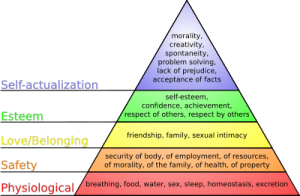Finding Happiness at Work
My job tends to focus on building healthy relationships, happiness, and productivity at work. Still, Eli Finkel’s research on marriages piqued my interest. With all the time we spend at work, why shouldn’t we ask as much of our job as we ask of our partners, family and friends? Finkel correlates historical expectations for a happy marriage to Maslow’s Hierarchy of Needs. He explains that for thousands of years, people looked to marriage to satisfy their basic physiological needs (food, shelter, sex, safety, etc.). But, when marriage was no longer necessary to secure those needs, it became a matter of love and belonging. Work, I think, is much the same. Getting a paycheck isn’t enough anymore. Working with a great team apparently isn’t enough either. Now, many seek jobs and marriages that will fuel their self-esteem and self-actualization and help them find happiness at work.

When did it happen that work became a source of self-identity? Finkel mapped these increasing expectations in marriage to a historical progression. Could the same be true of happiness at work? Examining feelings about work through a historical or generational lens is similarly illustrative.
Generational Expectations
Traditionalist generations typically looked to their jobs to satisfy “physiological” and “safety” needs. Folks worked hard, were dedicated to their jobs, and respected authority. The Baby Boomers who followed them focused on teamwork and collaboration. They sought careers that would provide fulfillment and gratification. But, because Boomers worked such long hours, strong peer relationships (“Love and Belonging”) became key to their happiness at work. Today, Gen Xers reject the Boomers’ workaholic approach and instead strive for work-life balance. They value time to pursue their own interests and be someone outside of work, as well. Climbing up the pyramid of happiness, they seek respect and achievement (“Esteem”), but not only from their work. Millennials, however, do scale their way to the top of the pyramid with respect to career aspirations. Pursuing self-actualization through their work, they value engagement, feedback, mentoring, and recognition of their contributions.
As interesting as these generalizations might be, I’ve always been wary of people talking about entire generations in such finite terms. I can imagine mapping this pyramid to an individual’s life cycle instead. As people age and progress in their career, they may ask different things of their work – earning a paycheck feels important to kids; love and belonging may take precedence for young adults; self-actualization becomes necessary in peak career years; then love and belonging returns to importance in post-retirement years.
So What? Find Happiness at Work through Career Growth & Learning
Whatever the reason someone might be looking for “self-actualization” from a job, doesn’t really matter. We must accept, however, that more and more people seek this top tier of happiness from their job. And, if they don’t reach it, they become unsatisfied. Those who find themselves unhappy with their work (or their marriage) have two choices – to change their situation or change their attitude about the situation. As Marcus Aurelius said,
The happiness of your life depends on the quality of your thoughts.
“If you are distressed by anything external, the pain is not due to the thing itself, but to your estimate of it; and this you have the power to revoke at any moment.” ~ Marcus Aurelius
As trainers and managers, we shouldn’t be surprised that, given the choice, employees would more likely to change jobs than stifle their professional aspirations. So rather than “blaming” people for job-hopping, we should ask ourselves how we can help our team grow.
Offering mentoring, coaching and feedback need not be difficult. Systems and structures can make it quite easy. These tools are perfect for creating a Self-Actualization-Friendly workplace:
KUDOS NOTES – Give feedback frequently with easy-to-use kudos notes.
COACHING TOOLS – Ask “GROW” questions to help your team identify Goals, current Realities, Options, and Ways to move forward.
FEEDBACK CARDS – Practice giving upward, downward, and peer-to-peer feedback with Feedback Decks.
CONVERSATION STARTERS – Talk about topics that matter like Happiness at Work, Diversity, Ethics, Team Dynamics, and Leadership.
By promoting growth in your organization, all employees are more likely to achieve higher and higher levels of happiness, no matter their age, seniority, or generation.
Read More…
Maslow’s Hierarchy of Needs for Trainers
Managing Conflict with the Pillar of Trust
Criticism, Feedback, and the Power of Praise
More on Maslow’s Hierarchy
In his 1943 paper, A Theory of Human Motivation, psychologist Abraham Maslow , [2] proposed the idea that a person’s most basic needs must be satisfied before higher order needs can be addressed.
The needs he identified are:
- Physiological – includes air, food, water, sex, sleep, other factors towards homeostasis, etc.
- Safety – includes security of environment, employment, resources, health, property, etc.
- Belongingness – includes love, friendship, intimacy, family, etc.
- Esteem – includes confidence, self-esteem, achievement, respect, etc.
- Self-actualization – morality, creativity, problem solving, etc.

